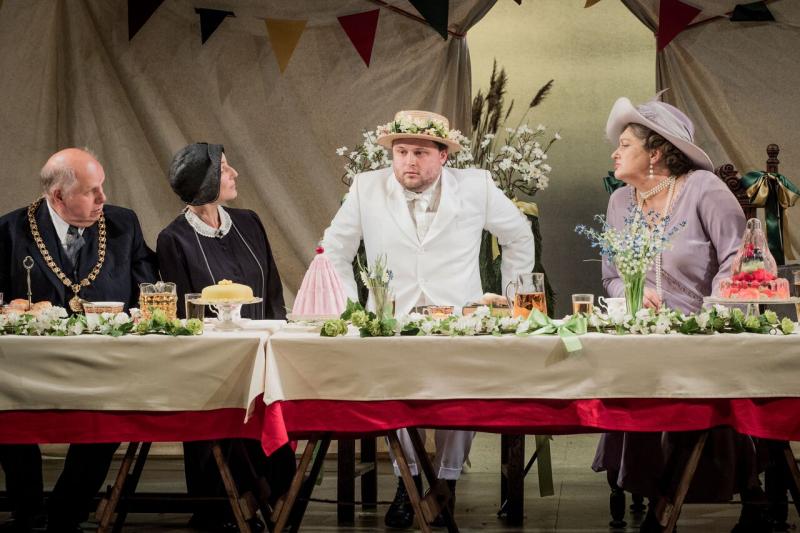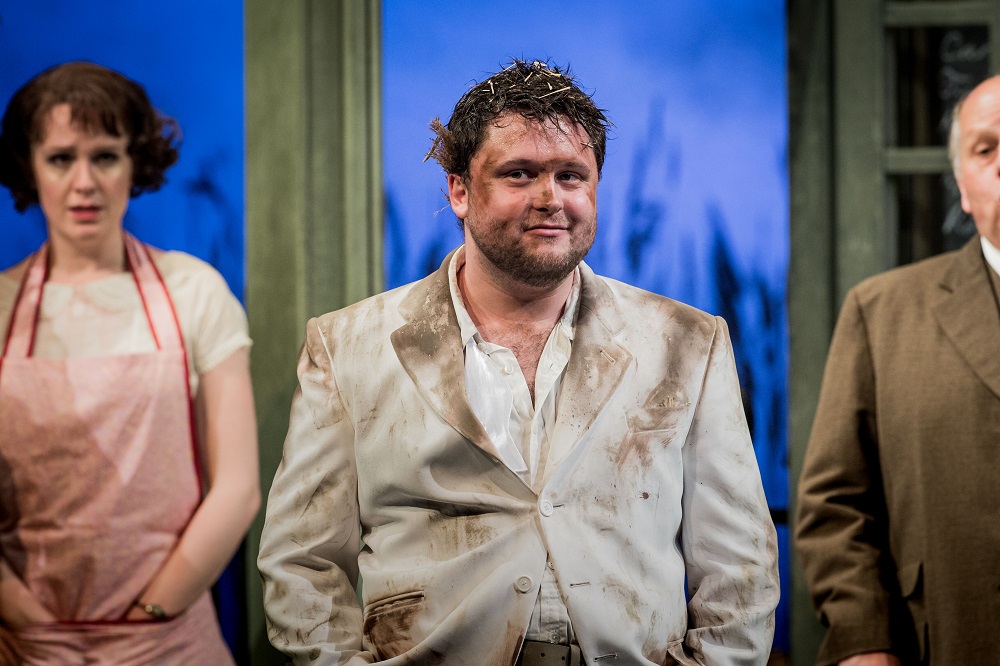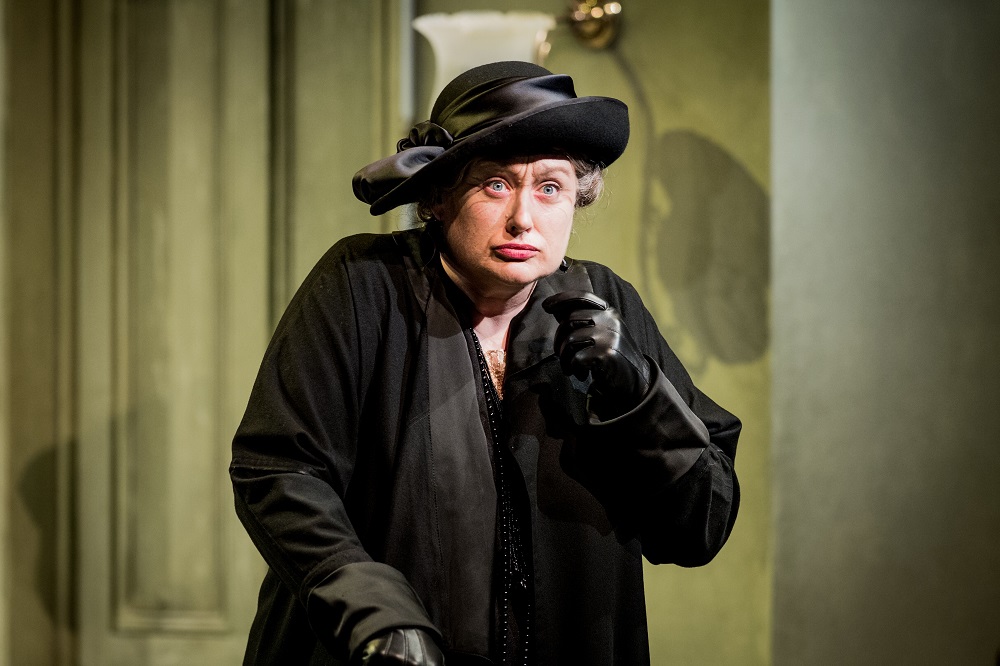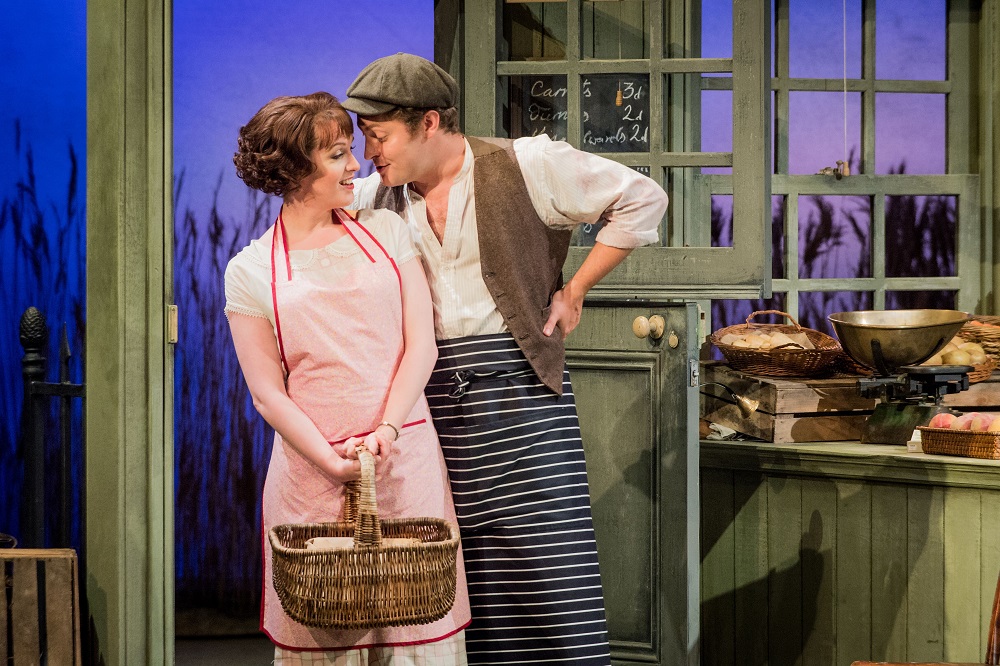Albert Herring, The Grange Festival review - playing it straight yields classic comedy gold | reviews, news & interviews
Albert Herring, The Grange Festival review - playing it straight yields classic comedy gold
Albert Herring, The Grange Festival review - playing it straight yields classic comedy gold
A true ensemble has a focused ball under veterans John Copley and Steuart Bedford

Perfect comedies for the country-house opera scene? Mozart's Figaro and Così, Strauss's Ariadne - and Britten's Albert Herring, now 70 years and a few days old, but as ageless as the rest. With the passing of time it's ever more obvious that this satire of provincial East Anglian tricks and manners also has universal appeal and stands with the best.
What extraordinary work from the Aurora Orchestra: from the vivid acidic bustling of Florence Pike, housekeeeper to Loxford eminence Lady Billows, you'd think a full symphony orchestra was at work, not just the 13 chamber-opera players. I'm reminded of tenor Ben Johnson who, when asked on the radio if Britten wrote especially well for the tenor voice, responded that he wrote superbly for all voices and all instruments. The harp alone seems to do the work of three or four; the woodwind enhance the Shakespearean pathos of the later scenes, especially when Britten writes his first ghostly operatic duet for alto flute and bass clarinet.

In perfect synch with their instrumental colleagues throughout, the singers are both magnificent soloists and - again as becomes especially apparent in Act 3 - team players. Richard Pinkstone gives us a different, and utterly credible, take on shop-boy Albert, the good boy voted May King since all the village girls are, in the words of the chief moralist, "not virgins but trollops". Tied to his widowed mum's apron strings but clearly strong enough to break loose from the first, this Albert has the operatic-tenor heft for the will to freedom in the voice from his very first scene, rather than the usual softer grain of the lyric-character choral scholar. The emancipation sees him very much in control (pictured above with Kitty Whately and Adrian Thompson); again, it's completely believable.
Around him the standard-bearers of provincial propriety lurk vulture-like, but even though they're types, we've all met them - even Orla Boylan's incredible transformation from a candid Tatyana and Sieglinde of yore into dragon dowager (pictured below) splendidly observed in the askance disapproval with which she views all and sundry and the constant distracted fiddling at the fete: part Dame Edna, part Geraldine James's Lady Maud in Blott on the Landscape, but never overplaying it and unleashing all her dramatic-soprano power when she needs it. Her accomplices include Clarissa Meek's gaunt Miss Pike - another classy lesson in letting the music and the words do a lot of the work - the toothy-radiant Miss Wordsworth of Anna Gillingham, very funny in the fete rehearsal with her pupils (Jack Stone, Emily Vine and Catriona Hewitson) and the clarion pomposity of Adrian Thompson's Mayor. Andri Björn Róbertsson's slow-witted Plod and Kathleen Wilkinson's Mum don't play it for laughs, but the show is none the worse for that.

Britten's parodies are always done with love and respect, so that they can end up being surprisingly moving - in the first place, the Reverend Gedge's homily on virtue, radiantly sung by Alexander Robin-Baker. Vocally, he's a more virile baritone than the more sensitive Timothy Nelson, a rather Liederish butcher's lad Sid in his first scene, but Nelson looks the part and is charmingly paired with the inimitable Kitty Whately as the pretty-compassionate Nancy (pictured below). Her Act Three aria of repentance, punctuated by rondo-like reappearances of the music for the hunt of the missing Albert, kicks off a final chain of surprisingly deep set pieces, culminating in the remarkable Passacaglia where all the adults bar the putatively dead one sing about mortality in a queasy mix of pathos and bathos (again, Mozart and Da Ponte couldn't have done it better).

The fun of the fete to crown the one true virgin works as brilliantly as ever in Copley's skilful staging and the perfect designs of Tim Reed, Prue Handley and Kevin Treacy, whose lighting effects a storm-brewing sunset transition to the poignant nocturne of the following scene. There's a lot of manoeuvring of realistic stage sets - presumably by the resident Grange chorus, wordless in this opera - but it's done smoothly so as not to mess with the superb instrumental interludes.
An evening of unalloyed pleasure, then, all the better for the comfortable seats with bags of leg room in the theatre - Grange Park's previous incumbents had taken all the extant fittings away - and the opening up of the view down to the lake, with fresh possibilities of walking to it. The only blot on the landscape is the champagne-bar extension blocking a view of the house's neoclassical portico. On the evidence of my first visit to the "new" Grange, though, artistic standards are at the highest level; this is the best show I've seen there since the daring shot at Prokofiev's The Gambler a decade ago, and a comic complement to the equally superlative Death in Venice at Garsington, also conducted by Bedford.
The future of Arts Journalism
You can stop theartsdesk.com closing!
We urgently need financing to survive. Our fundraising drive has thus far raised £49,000 but we need to reach £100,000 or we will be forced to close. Please contribute here: https://gofund.me/c3f6033d
And if you can forward this information to anyone who might assist, we’d be grateful.

Subscribe to theartsdesk.com
Thank you for continuing to read our work on theartsdesk.com. For unlimited access to every article in its entirety, including our archive of more than 15,000 pieces, we're asking for £5 per month or £40 per year. We feel it's a very good deal, and hope you do too.
To take a subscription now simply click here.
And if you're looking for that extra gift for a friend or family member, why not treat them to a theartsdesk.com gift subscription?
more Opera
 Buxton International Festival 2025 review - a lavish offering of smaller-scale work
Allison Cook stands out in a fascinating integrated double bill of Bernstein and Poulenc
Buxton International Festival 2025 review - a lavish offering of smaller-scale work
Allison Cook stands out in a fascinating integrated double bill of Bernstein and Poulenc
 Tosca, Clonter Opera review - beauty and integrity in miniature
Happy surprises and a convincing interpretation of Puccini for today
Tosca, Clonter Opera review - beauty and integrity in miniature
Happy surprises and a convincing interpretation of Puccini for today
 Hamlet, Buxton International Festival review - how to re-imagine re-imagined Shakespeare
Music comes first in very 19th century, very Romantic, very French operatic creation
Hamlet, Buxton International Festival review - how to re-imagine re-imagined Shakespeare
Music comes first in very 19th century, very Romantic, very French operatic creation
 Falstaff, Glyndebourne review - knockabout and nostalgia in postwar Windsor
A fat knight to remember, and snappy stagecraft, overcome some tedious waits
Falstaff, Glyndebourne review - knockabout and nostalgia in postwar Windsor
A fat knight to remember, and snappy stagecraft, overcome some tedious waits
 Salome, LSO, Pappano, Barbican review - a partnership in a million
Asmik Grigorian is vocal perfection in league with a great conductor and orchestra
Salome, LSO, Pappano, Barbican review - a partnership in a million
Asmik Grigorian is vocal perfection in league with a great conductor and orchestra
 Semele, Royal Opera review - unholy smoke
Style comes and goes in a justifiably dark treatment of Handelian myth
Semele, Royal Opera review - unholy smoke
Style comes and goes in a justifiably dark treatment of Handelian myth
 Le nozze di Figaro, Glyndebourne review - perceptive humanity in period setting
Mostly glorious cast, sharp ideas, fussy conducting
Le nozze di Figaro, Glyndebourne review - perceptive humanity in period setting
Mostly glorious cast, sharp ideas, fussy conducting
 Fidelio, Garsington Opera review - a battle of sunshine and shadows
Intimacy yields to spectacle as Beethoven's light of freedom triumphs
Fidelio, Garsington Opera review - a battle of sunshine and shadows
Intimacy yields to spectacle as Beethoven's light of freedom triumphs
 Dangerous Matter, RNCM, Manchester review - opera meets science in an 18th century tale
Big doses of history and didaction are injected into 50 minutes of music theatre
Dangerous Matter, RNCM, Manchester review - opera meets science in an 18th century tale
Big doses of history and didaction are injected into 50 minutes of music theatre
 Mazeppa, Grange Park Opera review - a gripping reassessment
Unbalanced drama with a powerful core, uninhibitedly staged
Mazeppa, Grange Park Opera review - a gripping reassessment
Unbalanced drama with a powerful core, uninhibitedly staged
 Saul, Glyndebourne review - playful, visually ravishing descent into darkness
Ten years after it first opened Barrie Kosky's production still packs a hefty punch
Saul, Glyndebourne review - playful, visually ravishing descent into darkness
Ten years after it first opened Barrie Kosky's production still packs a hefty punch
 Così fan tutte, Nevill Holt Festival/Opera North review - re-writing the script
Real feeling turns the tables on stage artifice in Mozart that charms, and moves
Così fan tutte, Nevill Holt Festival/Opera North review - re-writing the script
Real feeling turns the tables on stage artifice in Mozart that charms, and moves

Add comment